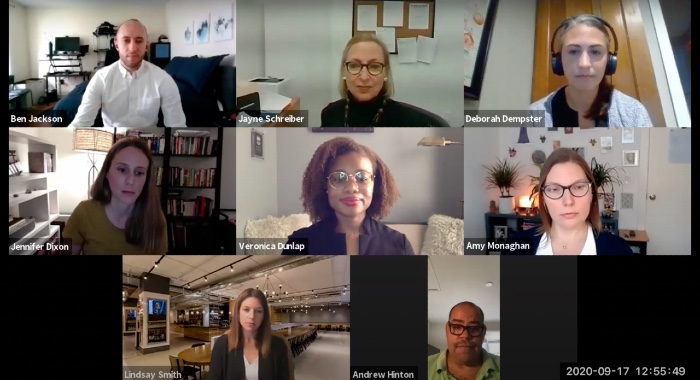From WhatsApp bots that link to do-it-yourself forms to utilizing algorithms in large-scale contract review projects, new technologies are becoming instrumental in completing many legal tasks. A panel of five legal technologists convened on Sept. 17 to speak with Fordham Law students about how technology is continuing to shape the practice of law. The panelists also delved into issues and opportunities that arise when relying on technology.
Professor Jennifer Dixon, who has served as the collection management librarian at the Maloney Library since May 2017, moderated the event, organized by Fordham Law’s Career Planning Center. The panel included Fordham Law alumni Veronica Dunlap ’14 and Andy Hinton ’89. Dunlap is the New York program director at ProBonoNet, where she spearheads LawHelpNYC and related technology initiatives that empower New Yorkers in need to resolve their legal problems while strengthening the work of advocates who serve them. Hinton, formerly vice president and chief compliance officer at Google, currently serves as a member of the board of advisors of #NotMe, a misconduct reporting platform.
Automation technology has been applied to template-based, transactional practices, which significantly speeds up the drafting and review process, according to Amy Monaghan, senior practice innovations manager at Perkins Coie and co-chair for the firm’s Innovation Working Group. She said this technology allows lawyers to focus more on consulting with clients, instead of rote tasks.
But when it comes to how technology is changing the legal profession, Monaghan emphasized that it is not replacing attorneys. Rather, she argues, it’s augmenting lawyers with automation tools and analysis tools, particularly in the realm of large-scale contract review and drafting.
“You’re talking about a process that would’ve taken days, weeks or months, depending on the size of that type of review project,” Monaghan explained. “Now you’re dumping [the information]all in, letting an algorithm do its job, and it’s surfacing all of the key information that attorneys would normally have to hunt and peck for. … It’s reducing the amount of time that they’re taking just finding information and it’s getting their eyes on that information a lot faster.”
In the pro bono and public interest world, in which Dunlap currently works, technology has made legal representation more accessible and user-friendly for her clients. She debunked the common misconception of high tech can be the one and only option or solution, speaking instead about how technology can be low-tech and still effective.
“It can be anything from a hotline to a Google doc to social media to some sort of AI tech,” Dunlap said. “Low or simple tech can be powerful, especially when you have a demographic that doesn’t have access to high-tech tools or platforms. And, it can facilitate work that otherwise would be challenging or impossible [to execute].”
Low tech, Dunlap explained, can include learning about free legal resources through Twitter, signing up for a consultation on a Google form, and offering pre-recorded training webinars for attorneys on hosted web platforms. In ProBonoNet’s case, for example, there is FEMAAppeals.org—a LawHelp interactive for individuals who have had their FEMA applications rejected—which guides clients on what to specifically include in their appeals.
One of the conversation’s most interesting points focused on what the future might look like as the worlds of law and tech continue to interact.
“Part of the biggest challenge to all the great advancements that tech, data analytics, and data usage more specifically holds is this issue of trust and the willingness of data owners that trust their data to organizations and individuals who can do amazing, incredibly helpful things with it—or, on the other hand, can do horribly disturbing things with it,” Hinton said.
He continued: “And in the absence of urgency and scarcity—like a global pandemic that forces you to adopt tech that might take much much longer to adopt in a different context—I think that, as lawyers, we can do a lot to help create better transparency, better accountability, more simplification and clarity around how data is used to fuel these incredibly sophisticated technology products and services. And if we can get that trust foundation better established, I think that’s the threshold to all of the great, amazing Wizard of Oz things that we think technology can deliver.”
For law students who may be curious and excited to learn more about this type of work, Dunlap said one does not need to necessarily have an interest in computer science.
“You’re going to learn while you’re there and then you can build on the knowledge once you’re actually in the door,” she advised. “I think … the basic understanding of computer science, the vocabulary to communicate with internal stakeholders, and maybe interpreting the needs of your clients and partners is necessary, but you don’t necessarily need coding skills or a computer science background when you step into the role or space.”





